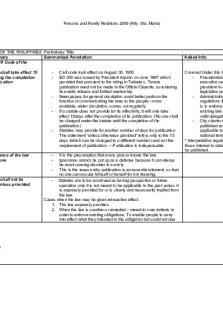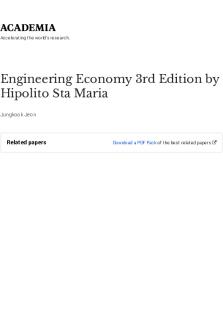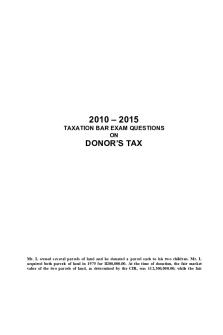Sta Maria Reviewer 2010 2011 PDF

| Title | Sta Maria Reviewer 2010 2011 |
|---|---|
| Course | Law On Obligations And Contracts |
| Institution | Far Eastern University |
| Pages | 92 |
| File Size | 1.6 MB |
| File Type | |
| Total Downloads | 77 |
| Total Views | 905 |
Summary
Reviewer, SY 2010- Based on Melencio Sta. Maria’s Obligations and Contracts: Text and Cases (2003) & class discussions with Atty. Mel Sta. Maria By Anna Bueno, IA 2014PRESCRIPTIONGENERAL PROVISIONSArt. 1106. By prescription, one acquires ownership and other real rights through the lapse of t...
Description
OBLIGATIONS AND CONTRACTS: Reviewer, SY 2010-2011 Based on Melencio Sta. Maria’s Obligations and Contracts: Text and Cases (2003) & class discussions with Atty. Mel Sta. Maria By Anna Bueno, IA 2014
PRESCRIPTION GENERAL PROVISIONS Art. 1106. By prescription, one acquires ownership and other real rights through the lapse of time in the manner and under the conditions laid down by law. In the same way, rights and conditions are lost by prescription. PRESCRIPTION An acquisition of a right by a lapse of time; a limitation which refers to the time within which an action must be brought after the right of action has accrued. A statute of repose whose object is to suppress fraudulent and stale claims from springing up at great distances of time Negligence as basis of prescription—Both kinds of prescription are essentially based on negligence of the owner of the right. Retroactive—Acquisition of rights through prescription is retroactive. One is deemed to have acquired the right at the moment the prescription began to run, once the period is completed. Prescription v. laches—Laches is based on grounds of public policy which requires, for the peace of society, the discouragement of stale claims PRESCRIPTION Fact of delay Fixed time Question of time Statutory Basis: law
LACHES Effect of delay Not time-bound Question of equity in permitting the enforcement of a claim Not statutory Basis: equity
Requisites of laches Conduct on the part of defendant, which gives rise to a claim Delay in asserting complainant’s rights, the complainant having the knowledge & opportunity to file suit Lack of knowledge or notice of the part of the defendant that the complainant would assert a right Injury or prejudice to the defendant in the event relief is accorded to the complainant
TYPES OF PRESCRIPTION a. Acquisitive—acquisition of a right; adverse possession; usurpation. Refers to the possessor as the actor, as a claimant in possession. Vests property. Basis: assertion of the usurper of an adverse right, uncontested by the true owner of the right, and gives rise to the presumption that the latter has given up the right to the former. Effect of acquisitive prescription? Two sides. - One side says the right to return the thing is extinguished upon prescription. - Another (Tolentino’s) says that a natural obligation to return the thing subsists, for two reasons: the law considers an obligation barred by prescription as a natural one1, and the voluntary return of the thing can be considered as a renunciation of prescription.2 1
Art. 1423. Obligations are civil or natural. Civil obligations give a right of action to compel their performance. Natural obligations, not being based on positive law but on equity and natural law, do not grant a right of action to enforce their performance, but after voluntary fulfillment by the obligor, they authorize the retention of what has been delivered or rendered by reason thereof. Some natural obligations are set forth in the following articles. Art. 1424. When a right to sue upon a civil obligation has lapsed by extinctive prescription, the obligor who voluntarily performs the contract cannot recover what he has delivered or the value of the service he has rendered.
2
Art. 1112. Persons with capacity to alienate property may renounce prescription already obtained, but not the right to prescribe in the future.
1
OBLIGATIONS AND CONTRACTS: Reviewer, SY 2010-2011 Based on Melencio Sta. Maria’s Obligations and Contracts: Text and Cases (2003) & class discussions with Atty. Mel Sta. Maria By Anna Bueno, IA 2014
b. Extinctive—loss of the right; limitation of actions. Refers to the neglect of the owner, who is out of possession. Bars the right of action. Basis: probability that alleged right never existed or has already been extinguished, or if it exists, the inconvenience caused by the prescription should be borne by the negligent party. Art. 1107. Persons who are capable of acquiring property or rights by the other legal modes may acquire the same by means of prescription. Minors and other incapacitated persons may acquire property or rights by prescription, either personally or through their parents, guardians or legal representatives. CAPACITY FOR PRESCRIPTION General rule: Capacity to acquire property or rights by other legal modes is required for prescription. Exception: Minors and other incapacitated persons with discernment can acquire through prescription, but this acquisition will be voidable or annullable, and can be ratified when the minor comes of age or when the incapacitated becomes capacitated. When discernment is absent, these persons can acquire through their legal representatives. This acquisition is completely valid. Discernment requires animus rem sibi habiendi (an intent to appropriate the thing as one’s own), an essential element of possession. VALID ACQUISITION Majority age Minority age or incapacitated, as long as through legal representatives
VOIDABLE ACQUISITION Minority age or incapacitated without the assistance of parents, guardians, or legal representatives
If the property requires just title: the same capacity required for the possession of title is required. If by donation, capacity for donees is required, etc. In other cases where title is unnecessary, capacity for possession is required—it is an element common to all kinds of acquisitive prescription.
Art. 1108. Prescription, both acquisitive and extinctive, runs against: (1) Minors and other incapacitated persons who have parents, guardians or other legal representatives; (2) Absentees who have administrators, either appointed by them before their disappearance, or appointed by the courts; (3) Persons living abroad, who have managers or administrators; (4) Juridical persons, except the State and its subdivisions. Persons who are disqualified from administering their property have a right to claim damages from their legal representatives whose negligence has been the cause of prescription. Art. 1109. Prescription does not run between husband and wife, even though there be a separation of property agreed upon in the marriage settlements or by judicial decree. Neither does prescription run between parents and children, during the minority or insanity of the latter, and between guardian and ward during the continuance of the guardianship. PERSONS AFFECTED BY PRESCRIPTION SUBJECTED TO PRESCRIPTION
NOT SUBJECTED TO PRESCRIPTION
2
OBLIGATIONS AND CONTRACTS: Reviewer, SY 2010-2011 Based on Melencio Sta. Maria’s Obligations and Contracts: Text and Cases (2003) & class discussions with Atty. Mel Sta. Maria By Anna Bueno, IA 2014
Minors and incapacitated persons who have parents, guardians, and legal representatives Absentees who have administrators appointed by them or the courts
Persons abroad who left managers or administrators
Juridical persons Will run against the State’s political subdivisions that act in their proprietary capacity (engaged in business, like a normal corporation).
Husband and wife, in specific cases provided by the law, such as legal separation, or objections to decisions made by the husband over the administration of common property. Parents and children during the age of majority of the latter, or when the children are in the age of majority and are sane --
When such minors do not have parents, guardians, or legal representatives When such absentee did not leave an administrator and there is no way that the absentee could return When such person abroad did not leave a manager/administrator and there is no way that the absentee could return to the domicile It does not run against the State and its political subdivisions acting in their sovereign capacity.
Husband and wife for all other cases, even though there be a separation of property agreed upon in the marriage settlememts or by judicial decree Parents and children during minority and/or insanity of the latter
Guardian and ward during the time of the guardianship
Art. 1110. Prescription, acquisitive and extinctive, runs in favor of, or against a married woman.
A useless article, honestly.
Art. 1111. Prescription obtained by a co-proprietor or a co-owner shall benefit the others. CO-OWNERSHIP; HOW PRESCRIPTION APPLIES General rule: Actual possession of the other parties in the co-ownership is not a requisite for the acquisition to favor the others. There is also no need for ratification of other co-owners in order that a prescription obtained by a party may benefit the others. Exception: When the prescription has no/distant relation with the properties owned in common, ratification is needed. Art. 1112. Persons with capacity to alienate property may renounce prescription already obtained, but not the right to prescribe in the future. RENUNCIATION OF PRESCRIPTION Bars the remedy, but does not bar the debt. Usually happens when there is a pending debt and the prescriptive time has elapsed, but the debtor acknowledges the debt and promises to pay it outside of the prescriptive period. The debtor effectively waives the right to the benefits of prescription, one of which is the inability of the creditor to collect the debt that has prescribed. Renunciation enables to creditor to recover the original contract.
3
OBLIGATIONS AND CONTRACTS: Reviewer, SY 2010-2011 Based on Melencio Sta. Maria’s Obligations and Contracts: Text and Cases (2003) & class discussions with Atty. Mel Sta. Maria By Anna Bueno, IA 2014
Unilateral—does not require the approval of the person benefited by it. Tacit—requires 1) acknowledgement of a debt and 2) the promise to pay it outside of the period and benefits of prescription Renunciation not valid when—1) Made in advance: an agreement that obligations arising from a contract shall not be subject to prescription is not binding. 2) Made by representatives: only persons with capacity to alienate property may renounce the prescription already obtained.
Art. 1113. All things which are within the commerce of men are susceptible of prescription, unless otherwise provided. Property of the State or any of its subdivisions not patrimonial in character shall not be the object of prescription. OBJECTS OF PRESCRIPTION Everything within the commerce of man, and can be appropriated, can be acquired by prescription. - Patrimonial property* is an exclusion from the properties of public dominion that cannot be acquired by prescription - This interpretation is based on statutory construction to reconcile a conflict between Art 1113 and Art 1108.3
NOT OBJECTS OF PRESCRIPTION Common things (air, high seas) Properties of public dominion** Intransmissible rights “Unless otherwise provided”—though within the commerce of man, the following cannot be acquired by prescription: - Movables possessed through a crime4 - Lands registered under the Torrens system5
* Patrimonial property is private government property that is no longer intended for public use or service, according to Art. 421 of the Civil Code. **According to Article 240 of the Civil Code, properties of public dominion include the following: 1. Those intended for public use, such as roads, canals, rivers, torrents, ports and bridges constructed by the State, banks, shores, roadsteads, and others of similar character 2. Those which belong to the State without being for public use, or are intended for some public service or for the development of national wealth. Art. 1114. Creditors and all other persons interested in making the prescription effective may avail themselves thereof notwithstanding the express or tacit renunciation by the debtor or proprietor.
Saving clause for creditors: Even if a person bound by the obligation renounces the prescription, a creditor can still plead the prescription, thereby resisting payment. This plea does not extend to other creditors.
Art. 1115. The provisions of the present Title are understood to be without prejudice to what in this Code or in special laws is established with respect to specific cases of prescription.
In case of a conflict between other Civil Code provisions: The more specific provision will prevail. In case of conflict between the Civil Code and other statutes: If there are different prescriptive periods and different types of causes of action, the provisions do not exclude each other from being availed of by the parties.
3
Art 1108 says prescription runs against juridical persons, but not against the State and its subdivisions. Art 1133. 5 Art 1126. 4
4
OBLIGATIONS AND CONTRACTS: Reviewer, SY 2010-2011 Based on Melencio Sta. Maria’s Obligations and Contracts: Text and Cases (2003) & class discussions with Atty. Mel Sta. Maria By Anna Bueno, IA 2014
Art. 1116. Prescription already running before the effectivity of this Code shall be governed by laws previously in force; but if since the time this Code took effect the entire period herein required for prescription should elapse, the present Code shall be applicable, even though by the former laws a longer period might be required.
Present Civil Code took effect on August 30, 1950. This article is a transitory provision. Three rules: 1. If the prescriptive period under the old Civil Code had already elapsed before the effectivity of the new Civil Code, the old prescriptive period applies. 2. If the prescriptive period under the old civil Code has not elapsed upon the effectivity of the new Civil Code, the new Civil Code will apply if the new Civil Code provides for a shorter time for the prescription. 3. If the prescriptive period under the old civil Code has not elapsed upon the effectivity of the new Civil Code, the old Civil Code will apply if the new Civil Code provides for a longer time for the prescription.
PRESCRIPTION OF OWNERSHIP AND OTHER REAL RIGHTS Art. 1117. Acquisitive prescription of dominion and other real rights may be ordinary or extraordinary. Ordinary acquisitive prescription requires possession of things in good faith and with just title for the time fixed by law. REQUISITES OF ACQUISITIVE PRESCRIPTION / TYPES 1.
Capacity to acquire by prescription 2. A thing capable of acquisition by prescription 3. Possession of the thing under certain conditions
ORDINARY PRESCRIPTION
EXTRAORDINARY PRESCRIPTION
See Art 1107
See Art 1107
See Art 1113
See Art 1113
4. Lapse of time provided by law
Good faith and with just title In the concept of an owner Open, exclusive, and uninterrupted ownership
Movable / personal property – 4 years6 Immovable property – 10 years7
Bad faith In the concept of an owner Open, exclusive, and uninterrupted ownership
Movable property – 8 years8 Immovable property – 30 years9
CONVERSION OF PRESCRIPTION What if a possessor’s good faith transforms to bad faith?: Three possible solutions10, but the most acceptable solution is that the prescription will be extraordinary but the possession in good
6
Art 1132 Art 1134 8 Art 1132 9 Art 1137 7
5
OBLIGATIONS AND CONTRACTS: Reviewer, SY 2010-2011 Based on Melencio Sta. Maria’s Obligations and Contracts: Text and Cases (2003) & class discussions with Atty. Mel Sta. Maria By Anna Bueno, IA 2014
faith shall be computed in proportion to the period of extraordinary prescription. This reflects the difference between the two kinds of acquisitive prescription, and puts value to the possession in good faith. Art. 1118. Possession has to be in the concept of an owner, public, peaceful and uninterrupted. Art. 1119. Acts of possessory character executed in virtue of license or by mere tolerance of the owner shall not be available for the purposes of possession. POSSESSION, TO BE VALID, MUST BE: 1.
In the concept of an owner The possessor asserts dominion on the property to the exclusion of all others; must be en concepto dueño, an adverse possession Acts pertaining to the concept of an owner: (Ramos v. CA) continuous possession, payment of real estate taxes Not in the concept of an owner: a. Mere possession with a juridical title (unless such title is repudiated), such as being a trustee, usufructuary, lessee, agent, pledge b. That which subsists by mere tolerance or is in virtue of a license, because both of these imply consent on the part of the owner, and thus constitute a recognition by the possessor that somebody else owns the property c. Merely transient, in which case the owner is not divested of the title, but cannot exercise ownership in the meantime
2. Public—a notorious holding of the property known to the community 3. Peaceful—for the period of years required by law for the acquisitive prescription to apply, there must be no valid interference from others claiming or asserting their rights to the property 4. Uninterrupted—see following notes. Art. 1120. Possession is interrupted for the purposes of prescription, naturally or civilly. Art. 1121. Possession is naturally interrupted when through any cause it should cease for more than one year. The old possession is not revived if a new possession should be exercised by the same adverse claimant. Art. 1122. If the natural interruption is for only one year or less, the time elapsed shall be counted in favor of the prescription. Art. 1123. Civil interruption is produced by judicial summons to the possessor. Art. 1124. Judicial summons shall be deemed not to have been issued and shall not give rise to interruption: (1) If it should be void for lack of legal solemnities; 10
The other two are: 1) the bad faith erases the good faith, and the time of extraordinary prescription will run from the time of possession in bad faith (this puts the possessor in a worse place than one who started in bad faith), and 2) the period of extraordinary prescription will run from the time the possession began (gives identical effect to both kinds of acquisitive prescriptions).
6
OBLIGATIONS AND CONTRACTS: Reviewer, SY 2010-2011 Based on Melencio Sta. Maria’s Obligations and Contracts: Text and Cases (2003) & class discussions with Atty. Mel Sta. Maria By Anna Bueno, IA 2014
(2) If the plaintiff should desist from the complaint or should allow the proceedings to lapse; (3) If the possessor should be absolved from the complaint. In all these cases, the period of the interruption shall be counted for the prescription. Art. 1125. Any express or tacit recognition which the possessor may make of the owner's right also interrupts possession. INTERRUPTIONS TO PRESCRIPTION Once interrupted, all the benefits already accrued in prescription cease; when the prescription runs again, it will be a new one. It is in suspension where past periods may be included in the computation (e.g., suspension because of insanity of a child or during guardianship11) NATURE OF INTERRUPTION a. Natural—any cause except civil b. Civil—comes in the form of judicial summons to the possessor —interruption occurs upon receipt of the judicial summons, and not the date of filing of a complaint
c.
Express or tacit recognition by possessor of owner’s right—one cannot recognize the right of another and at the same time claim adverse possession which can ripen into ownership.
INTERRUPTED For a period more than one year.
NOT INTERRUPTED If the time elapsed is one year or less. It shall be considered an It shall not be considered an interruption: interruption: 1) If the judicial summons 1) If the judicial summons is valid, is v...
Similar Free PDFs

Sta Maria Reviewer 2010 2011
- 92 Pages

Oblicon-Ateneo-Sta-Maria-Reviewer (1)
- 116 Pages
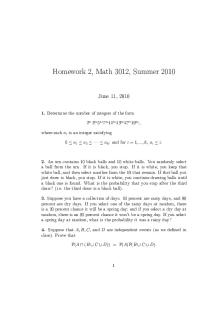
2010-2011 Homework 2
- 2 Pages
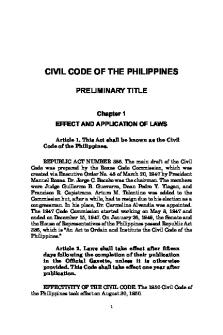
Persons and Family Relations (Sta. Maria)
- 1,002 Pages
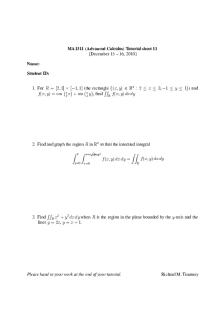
MA1132 2010-2011 Tutorial 11
- 1 Pages

UP 2010 OBLICON reviewer
- 46 Pages
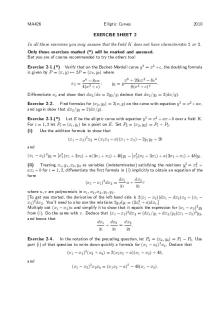
MA426 2010-2011 Problem Sheet 2
- 2 Pages

GProject STA 220
- 24 Pages
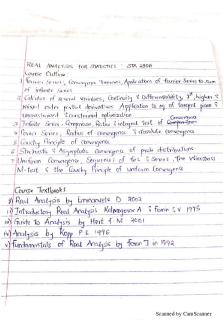
STA 2306 REAL Analysis
- 39 Pages
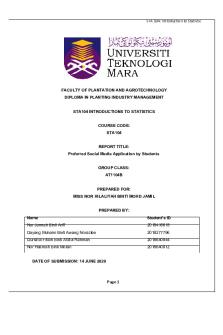
Assignment STA Written Report
- 19 Pages
Popular Institutions
- Tinajero National High School - Annex
- Politeknik Caltex Riau
- Yokohama City University
- SGT University
- University of Al-Qadisiyah
- Divine Word College of Vigan
- Techniek College Rotterdam
- Universidade de Santiago
- Universiti Teknologi MARA Cawangan Johor Kampus Pasir Gudang
- Poltekkes Kemenkes Yogyakarta
- Baguio City National High School
- Colegio san marcos
- preparatoria uno
- Centro de Bachillerato Tecnológico Industrial y de Servicios No. 107
- Dalian Maritime University
- Quang Trung Secondary School
- Colegio Tecnológico en Informática
- Corporación Regional de Educación Superior
- Grupo CEDVA
- Dar Al Uloom University
- Centro de Estudios Preuniversitarios de la Universidad Nacional de Ingeniería
- 上智大学
- Aakash International School, Nuna Majara
- San Felipe Neri Catholic School
- Kang Chiao International School - New Taipei City
- Misamis Occidental National High School
- Institución Educativa Escuela Normal Juan Ladrilleros
- Kolehiyo ng Pantukan
- Batanes State College
- Instituto Continental
- Sekolah Menengah Kejuruan Kesehatan Kaltara (Tarakan)
- Colegio de La Inmaculada Concepcion - Cebu
